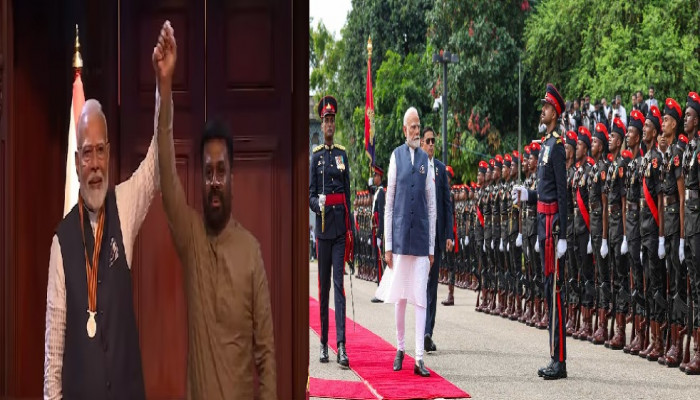Shedding Historical Baggage, India-Sri Lanka Deepen Ties
- In Foreign Policy
- 02:04 AM, Apr 11, 2025
- Ramaharitha Pusarla
After the Maldives and Bhutan, Sri Lanka became the third country in the immediate neighbourhood to confer the highest civilian honour, Sri Lanka Mitra Vibhushana, on Prime Minister Modi during his recently concluded three-day State visit to Colombo. Beyond symbolism, the State Honours are a token of gratitude and recognition of exceptional diplomatic efforts and solidarity with the people of the nation. The Honour is a testament to the nation’s commitment to nurturing friendly relations with foreign nations.
After President Anura Kumara Dissanayake of the National People’s Power Coalition (NPP-JVP) assumed charge in September 2024, there were rational fears about the implications of regime change in Sri Lanka on India. Janata Vimukti Peramuna (JVP), the major partner of the coalition, is a strong leftist party, perceived to be pro-China. This has stoked rational fears of the current regime getting too close to China. In the past, JVP strongly opposed Indian troop presence in Sri Lanka.
India enjoyed a very cordial relationship with the previous Sri Lankan dispensation led by President Ranil Wickremesinghe. Wickremesinghe, on many occasions, expressed gratitude to India for its stabilising role during Sri Lanka’s economic collapse in 2022. He implemented a vision document charted with India that discussed the feasibility of a land bridge and the Economic and Technological Cooperation Agreement (ETCA).
The near complete sweep of the NPP-JVP coalition, even in the Parliamentary elections, spelled out the Sri Lankan public’s firm support for a systemic reformist agenda advocated by President Dissanayake. A unified mandate reflected people's aspirations of ending decades of misgovernance and economic revival. Adopting a pragmatic approach during his campaign, AKD made no anti-India remarks. However, he pledged to bring about transparency in Chinese investments in Sri Lanka. Demonstrating a quick understanding of the vision of the current dispensation, EAM Jaishankar visited Colombo immediately after the election, assuring India’s support to Sri Lanka’s economic and security priorities.
Critical of the previous regime’s decisions, the new government opened an investigation into the Adani Wind Power Project, backtracked on the privatisation of Sri Lankan Airlines, in which Indian firms were keen to invest and reversed the decision to award management of Mattala airport to an India-Russia joint venture. However, asserting his priority to pursue national interests, Dissanayake made India his first foreign destination for a state visit.
On his India visit in December 2024, leaders of both countries adopted a Joint Vision of Fostering Partnerships for a Shared Future, laying out broad contours of enhanced cooperation. This included counter terrorism, money laundering, drug trafficking, joint training, maritime surveillance, cooperation on hydrography, defence cooperation and energy cooperation. Nevertheless, striking a balance in relations with India and China, Dissanayake visited Beijing in January 2025. But the Chinese engagement was rather vague and lacked clarity.
PM Modi who arrived in Colombo on April 5th, was the first leader to be hosted by the Dissanayake regime. Received by six cabinet ministers led by the foreign minister Vijitha Herath, PM Modi extended a ceremonial welcome at the Independence Square. Per sources, this marks the first occasion when a foreign leader was bestowed such an honour at the Square which commemorates Sri Lankan independence from the British.
PM Modi and President Dissanayake reviewed the areas of cooperation during the bilateral talks and announced two landmark agreements- a defence cooperation agreement and a trilateral cooperation agreement to make Trincomalee an energy hub.
As a part of third country cooperation, India, along with its Strategic Partner UAE, has signed an MoU with Sri Lanka to develop a multi-faceted energy hub in Trincomalee. Previously, India inked trilateral cooperation agreement for Colombo port development project involving Japan. But that failed takeoff due to the perceived China-Japan rivalry. The UAE has good relations with both India and China. The promising inclusion of the UAE, an energy major, is a stroke of diplomatic genius.
China has firmly established its influence in Sri Lanka with large-scale infrastructure projects, including an oil refinery and a port at Hambantota, and Mattala airport in the Southern Province. India’s proactive engagement with Colombo, with the UAE’s participation, to develop a regional energy logistics centre at Trincomalee in Eastern Province, can counterbalance Beijing and address the severe power crisis of the island. The power crisis had indeed exacerbated the Aragalya protests of 2022.
China has been keen to extend its influence in the Northern Province of Jaffna, India's strategic underbelly. Predominantly a Tamilian province, the NPP-JVP Coalition made major gains in Jaffna during the Parliamentary election, fuelling real concerns of Beijing making quick inroads into this region. An energy hub in Trincomalee and the MoU signed on the electric grid interconnection for import and export of power can potentially reduce Sri Lanka’s reliance on China for power.
After assuming power, Dissanayake prioritised economic revival and national security. Aligning with his foreign policy interests, India concluded the debt restructuring process with Sri Lanka, converting a $100 million loan into grants and reducing interest rates. Geopolitical uncertainties have reinforced a glaring reality of the interconnected nature of the national security of India and Sri Lanka.
At the press conference in Colombo, PM Modi said, “We believe that we have shared security interests. The security of both countries is interconnected and co-dependent”. In turn, President Dissanayake stated, “Sri Lankan territory will not be used or be allowed to be used in any manner that is inimical or detrimental to India's interests”.
In a bid to secure shared security interests, India and Sri Lanka have signed an MoU on defence cooperation. According to sources, the defence agreement has a framework designed for five years comprising high-level military exchanges, joint exercises, capacity building, humanitarian assistance and disaster relief (HADR) operations, naval port calls and cooperation between defence industries. Indeed, the conversations on defence cooperation commenced in December 2024 during Dissanayake’s visit to India.
This agreement, along with existing maritime cooperation through Colombo Security Cooperation, will provide a new impetus to the defence partnership. The revival of defence marks a new beginning in the India-Sri Lankan contentious past.
Countries have signed MoUs on cooperation on digital solutions, multi-sectoral grant assistance of 2.4 billion Sri Lankan Rupees for the eastern province, health &medicine and pharmacopoeia. Leaders have inaugurated the railway track of Maho-Omanthai, launched the construction of the signalling system for the Maho-Anuradhapura railway line. They virtually inaugurated a temperature-controlled first-of-its-kind agriculture warehouse in Dambulla, laid the foundation for the Sampur Solar power project and witnessed the supply of solar rooftop systems for 5000 religious institutions across Sri Lanka.
PM Modi announced a comprehensive capacity-building programme for youth, judges, entrepreneurs, media personnel and training for 700 Sri Lankan personnel and pointed to the completion of 10,000 houses for Tamilians. He also offered to send the relics of Lord Buddha found in the Aravali region excavations in Gujarat on International Vesak Day. Describing India and Sri Lanka as “Civilisation twins”, PM Modi announced grant assistance for the Thirukoneswaram Temple, popularly known as Kailash of South; Sita Eliya Temple in Nuwara Eliya and Sacred City Complex Project in Anuradhapura.
India’s unprecedented assistance of over US$4 billion through loan deferrals, currency swaps, grants, short-term loan facilities, humanitarian relief, lines of credit and necessary guarantees needed for the $2.9 billion IMF bailout, unlike Chinese loans, has aided in Sri Lanka’s return to sustainable economic recovery.
Though the frequent arrest of Indian fishermen and confiscation of their boats by the Sri Lankan Navy and the strong statements by Tamil Satraps often rock the bilateral ties, countries are now trying to evolve a cooperative framework. Notwithstanding the politically motivated resolution by the Tamil Nadu assembly to reclaim the Katchatheevu Islands, coinciding with PM Modi’s visit to Sri Lanka, the countries have displayed enormous maturity to rise above these irritants.
Deploying a multi-faceted diplomacy, PM Modi has reached out to Sri Lanka. Ratcheting up cultural diplomacy, PM Modi visited the Maha Bodhi Tree and sought the blessings of Buddhist Saints at Anuradhapura. The Prime Minister also briefly conversed with players of the Sri Lankan Cricket World Cup-winning team. Embalming the old scars, PM Modi laid a wreath at the Indian Peace Keeping Force (IPKF) memorial, acknowledging the supreme sacrifice of Indian soldiers. Not allowing the past mistakes to overwhelm the trajectory of current relations, PM Modi displayed an extraordinary Statesmanship in walking an extra mile to fortify ties with the island.
By shedding the historical baggage, leaders of both countries have displayed enormous conviction to rebuild the relations on the foundations of mutual respect and goodwill. As the US and China trade spat intensifies, fuelling global rifts, a stable neighbourhood front can certainly serve as a bulwark against the external pressure. The pragmatic approach adopted by the countries attests to the same.
References
- https://www.mea.gov.in/bilateral-documents.htm?dtl/39377/List_of_Outcomes_Visit_of_Prime_Minister_to_Sri_Lanka_April_04__06_2025
- https://www.mea.gov.in/media-briefings.htm?dtl/39378/Transcript_of_Special_briefing_by_MEA_on_Prime_Ministers_visit_to_Sri_Lanka_April_05_2025
- https://www.tamilguardian.com/content/explained-new-india-sri-lanka-defence-agreement
- https://www.mea.gov.in/Speeches-Statements.htm?dtl/39376/English_Translation_of_Press_Statement_By_Prime_Minister_during_the_Joint_Press_Statement_with_President_of_Sri_Lanka_April_05_2025
Disclaimer: The opinions expressed within this article are the personal opinions of the author. MyIndMakers is not responsible for the accuracy, completeness, suitability, or validity of any information on this article. All information is provided on an as-is basis. The information, facts or opinions appearing in the article do not reflect the views of MyindMakers and it does not assume any responsibility or liability for the same.







Comments